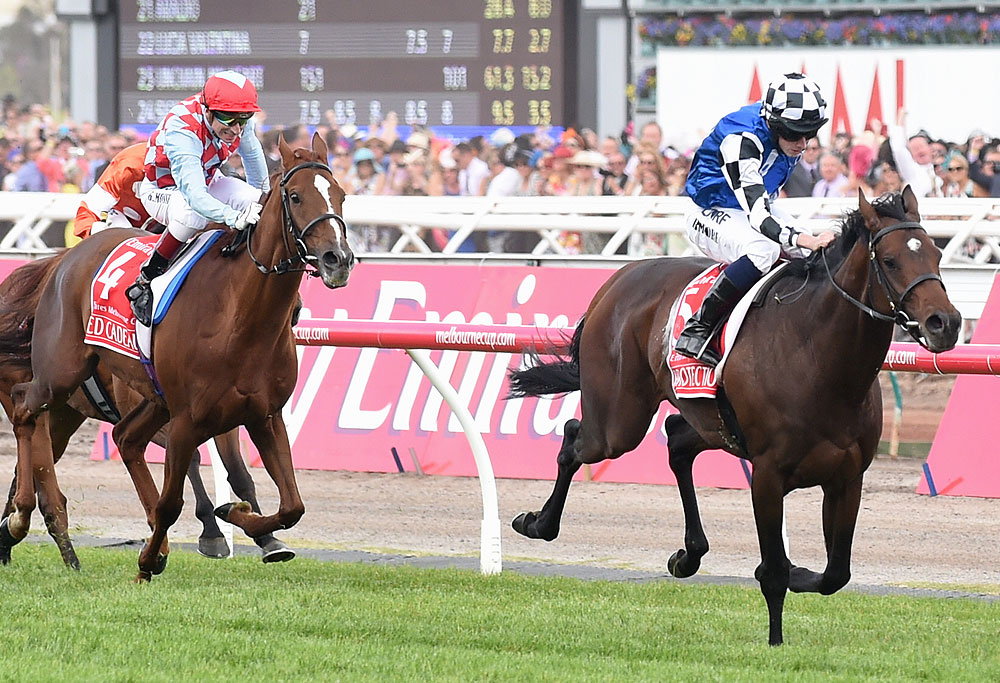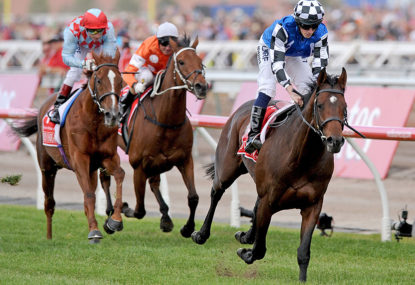I no longer bet on horse races, nor will I ever watch one for entertainment again. I just can’t condone it anymore.
However, I doubt I’ll be missed. I’m just one person. Right?
I know nothing about horse racing anyway. Here’s my total knowledge:
1. Jockeys are short
2. All horses were born on August 1
3. Some horses are girls and some are boys
4. Some of the boys have their nuts cut off
5. People bet on horse races
6. Most of them have no idea what they are doing and only bet on the big races:
– the Cox Plate
– the Caulfield Cup
– the Golden Slipper; but mostly, of course
– the Melbourne Cup
7. Sports betting agencies love people betting, especially when they have no idea what they are doing.
Each year, on the first Tuesday in November hordes of us engage in our only gambling on horse racing for the year.
We organise work lunches and sweeps and then head off to the TAB where we get in the way of the hardened gamblers and get everything wrong.
We then discuss which horses we’ve bet on like we know anything about it. We take a $2 sweep for each of our kids.
Hordes of us also head out to the racecourses around Australia to engage in a yearly pilgrimage of excess and hedonism.
However, I’ve had enough of it. I can no longer stand by and give my tacit approval to what is effectively a death sentence for many horses.
In the last three years four horses have died for our entertainment in “The race that stops the nation.”
In 2013 Verema was destroyed after getting injured during the race. In 2014 Admire Ratki died in its stall after the race and Araldo got spooked and broke its leg kicking out. Last year Red Cadeaux was destroyed after complications following surgery treating an injury sustained in the race.

Let me make something clear: I don’t like horses. They scare me. They are big, strong and they are intelligent. They figure out in a very short period of time that I’m scared of them and have traditionally done nothing I ask them to do. All I’ve ever asked them to do is let me sit on their back while they wander around, in a direction I nominate. While they have often borne my mass, they always end up nominating the direction.
And why should they do what I ask? These are majestic creatures and I’m just some chinless, fat guy.
However, last year I realised – while hoping that Red Cadeaux pulled through – that each year I expect horses to risk their lives in the name of my entertainment.
And mostly they risk their lives because, although their injuries could mostly be repaired, it would cost lots of money and time, and the owners of the horses concerned couldn’t justify that investment because they’d probably never compete again.
Horse racing isn’t about the spectacle, or the fashions of the field or the pageantry. It’s about money and only money.
So the grey blanket gets raised and the horse gets “destroyed.”
The first time this horror really occurred to me was in 1998 while witnessing Three Crowns snapped leg – an incident that was replayed a number of times. It would never race again. Everyone knew that horse was about to be killed.
I’ve been at the ground when three footy players’ careers were effectively ended through injury. In 2003 I was at the Rugby World Cup final when Wallaby and Brumbies prop Ben Darwin broke his neck. In 2008 I was at the MCG when Collingwood player Sean Rusling’s shoulder popped out again. In 2010 I was at Canberra Stadium when Terry Campese’s ACL ruptured which, as it turned out, effectively ended his competitive career.
Like racing horses, every week professional sportspeople take to sporting arenas and expose themselves to injury.
However, unlike the horses:
– they are aware of the risks;
– they enter the arena voluntarily;
– they get paid for their services; and most crucially
– if they suffer a serious injury we don’t have the option to destroy them.
Can you imagine if we did?
It’d be like returning to the days of gladiators.
Instead we actively try to rehabilitate them, even when they are unlikely to ever play again.
However, in the world of horse racing we hear things like “it couldn’t be repaired” or “they wouldn’t be able to have a full life” or even “they’d be in a lot of pain.”
At the end of the day I feel that these are mostly just piss poor platitudes to try and justify the wastage of the animals who no longer can make money and instead would require lots of money and effort for zero return.
And every year as more horses die for our amusement – 132 (that we know of) in Australia from 1 August 2015 to 31 July 2016, one every three days – we effectively turn a blind eye and we cheer on their desperate plight while we eat and drink to excess, and, of course, gamble – just like the Colosseum crowds two millennia ago.
While I’ve never really bet on horse races outside of the Melbourne Cup, I used to love having a Friday night punt on the dish lickers. I had no idea what I was doing but I found the absurdity and chaos of Greyhound races superb.
That the dog in the Geelong colours could take out the favourite by trying to root her on the first corner, causing a pile up that meant the dog in the green vest – who was at 35/1 -somehow got up, was hilarious to me.
Then I found out about live baiting and mass graves of greyhounds who weren’t fast enough to compete for my amusement…
I haven’t bet on the dogs since. Nor will I again. Knowing what I now know if I bet on greyhound races I’m giving my approval for these practices to continue.
I just can’t do that.
And now I’ve decided that I also won’t bet on horse races again.
I recognise that I’m just a drop in the ocean, but hopefully lots of you will come to agree with me.
Just think of it this way: I was in a lot of pain after I smashed my knee. It took it years to feel better. Some days I was in lots of pain and the surgery and recovery cost lots of money.
However, I’m glad they actually tried to fix me. I’m glad I wasn’t killed because it was easier. I’m glad I wasn’t a horse.
While so many will be avidly watching the race, I’ll just be hoping no horses die.






























































































